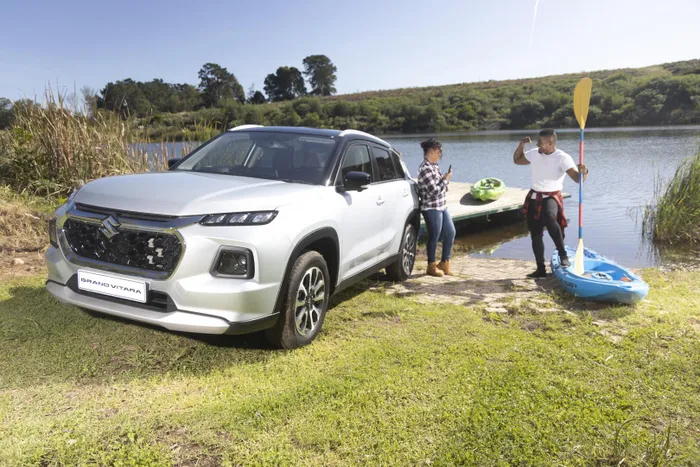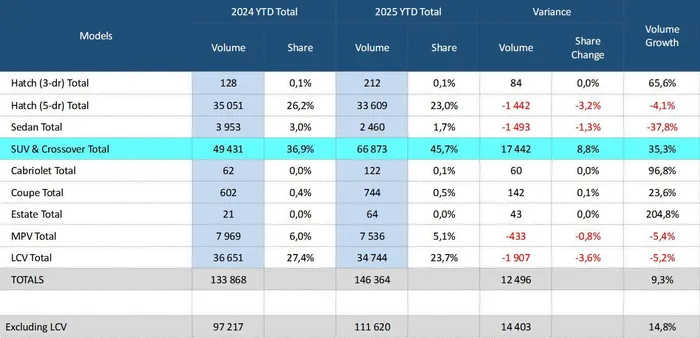Performance or practicality? Here's what South Africans really want in a vehicle

Practicality is most important to car buyers in South Africa, a new study shows.
Image: Supplied
When it comes to purchase decisions, there is one factor that tops the shopping list for most vehicle buyers and that is practicality.
According to a study conducted by consumer insights agency KLA, 88% of South African vehicle buyers say that having a car that works well for the whole family is important to them.
Yet while family functionality is something that they prioritise above all other vehicle features, performance comes a close second, with 80% of respondents indicating that they prefer cars with powerful engines.
"Despite the global shift toward greener driving, many local consumers still associate engine performance with value," says Rakhee Naik, Managing Consultant, Insights at KLA. "For some, it's about the thrill of driving. For others, it's about dependability on South African roads and terrain."
While younger car buyers see performance cars as aspirational status symbols, older generations associate power with long-term durability and load-hauling capability, the study found.
When it comes to new energy vehicles, there is a clear acknowledgement that South Africans need to move towards cleaner energy sources, yet despite this, 71% of potential buyers said they still prefer petrol-powered vehicles. This is largely due to affordability concerns as well as infrastructure limitations.
However, 72% of survey respondents feel that the future of motoring is electric, and 62% feel we should all drive less to preserve the environment.
When it comes to vehicle types, SUVs and crossovers have emerged as the most popular body shape, having overtaken hatchbacks in 2021.

Most popular vehicle types in 2025
Image: Hyundai
45.7% of all the vehicles sold in South Africa during the first half of 2025 were SUVs and crossovers, according to industry-wide data released by Hyundai. Light commercial vehicles (including bakkies) follow in a distant second at 23.7%, followed closely by hatchbacks, at 23.1%. Multi-purpose vehicles (MPVs) have a 5.1% share, while the once-popular sedans account for just 1.7% of the market.
If we exclude light commercial vehicles from the equation, SUVs and crossovers command a 60% share of the passenger vehicle market, with hatchbacks following at 30% - exactly half the overall volume.
The top-selling SUVs in the first half of 2025 were the Toyota Corolla Cross, with a monthly average of 1,596 units. It was followed by the Chery Tiggo 4 Pro (1,216), Suzuki Fronx (1,077), Haval Jolion (1,064) and Toyota Starlet Cross (865) - read the full list here.
According to Lightstone data, the Western Cape is the province that embraces SUVs the most, with this body type accounting for more than 50% of overall new vehicle sales, while the SUV market share is 47% in Gauteng and 45% in KwaZulu-Natal. The latter still has the largest hatchback share, among the provinces, at 25%.
The SUV market is set to heat up further with the imminent arrival of Chinese brands such as Changan, while already established Jetour is set to launch its rugged-looking T1 and T2 models in South Africa this month.
“The popularity of SUVs in South Africa is about more than just their look and ability to be a great family vehicle – more so than in other parts of the world. Our country’s expansive network of gravel and dirt roads, along with potholes, can be especially damaging to a car’s suspension and tyres. An SUV can typically survive in this kind of terrain without getting damaged,” says Auto & General.
Not all SUVs are born equal in this regard. A bakkie-based SUV, such as a Toyota Fortuner, will have superior rugged road capabilities than a crossover that’s heavily based on a car, such as the Corolla Cross. But conversely, a Fortuner, with its higher ground clearance and ladder frame chassis, will offer inferior stability during an emergency manoeuvre, with the driver facing a higher risk of a rollover.
IOL Motoring
Related Topics: